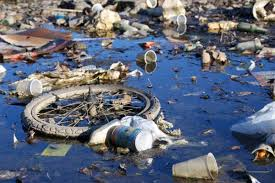
- As well as industrial waste products that are continuously being released into lakes, rivers and other water bodies. This is destroying our marine life and other water bodies.
- In many rural areas one can still find people bathing and cooking in the same water, making it incredibly filthy.
- Acid rain further adds to water pollution in the water.
- Water pollution can also indirectly occur as an offshoot of soil pollution – through surface runoff and leaching to groundwater.
- Thermal pollution* and the depletion of dissolved oxygen aggravate the already worsened condition of the water bodies.
- Thermal pollution is the degradation of the quality of water caused by the dumping of heated gases or heated wastewater often from power plants and industrial manufacturer into the water. A rise in the temperature of rivers and lakes can threaten plants and animals living in it.(Thermal pollution in the air can affect the weather)
WHAT CAN WE DO TO REDUCE WATER POLLUTION?
There are many things that we can do to help prevent water pollution of rivers and lakes as well as groundwater and drinking water by following some simple guidelines in your everyday life.
- DO NOT pour fat from cooking or any other type of fat, oil, or grease down the sink. Keep a “fat jar” under the sink to collect the fat and discard in the solid waste when full.
- DO NOT dispose of household chemicals or cleaning agents down the sink or toilet
- DO NOT flush pills, liquid or powder medications or drugs down the toilet.
- Avoid using the toilet as a wastebasket. Most tissues, wrappers, dust cloths, and other paper goods should be properly discarded in a wastebasket. The fiber reinforced cleaning products that have become popular should never be discarded in the toilet.
- Run the dishwasher or clothes washer only when you have a full load. This conserves electricity and water.
- Use environmentally friendly household products - washing powder, household cleaning agents and toiletries.
- Use the minimum amount of detergent and/or bleach when you are washing clothes or dishes. Use only phosphate free soaps and detergents.
- Minimize the use of pesticides, herbicides, fertilizers. This will prevent runoffs of the material into nearby water sources.
- DO NOT dispose of these chemicals, motor oil, or other automotive fluids into the sanitary sewer or storm sewer systems. Both of them end at the river.
- Conserve water by turning off the tap when running water is not necessary. This helps prevent water shortages and reduces the amount of contaminated water that needs treatment.
Don’t throw litter into rivers, lakes or oceans. Help clean up any litter you see on beaches or in rivers and lakes, make sure it is safe to collect the litter and put it in a nearby dustbin.
REMEMBER: Recycle and dispose of all trash properly. Never flush non-degradable products -- such as disposable diapers or plastic tampon applicators -- down the toilet. They can damage the sewage treatment process and end up littering beaches and waters. And make sure to properly dispose of all pet waste from your property to keep it out of storm drains and water supplies.
Use Native plants since they need less water, are more tolerant of drought conditions, cost less to maintain and provide habitat for birds and butterflies. Apply natural fertilizers and soil conditioners, such as compost, peat, rotted manure, and bone meal to stimulate plant growth and retain soil moisture. You can create your own compost; compost bins are widely available for purchase,
WATER IS ONE OF THE WORLD'S MOST IMPORTANT RESOURCES.
One more thing, it is important we speak up against industries that are contributing to the destruction of our streams, rivers, and beaches. Every action we take makes a difference.
Be an activist. We should educate ourselves about the water issues in our community.
“Just because it disappears, doesn’t mean it goes away”
Source:
http://www.simsbury-ct.gov/water-pollution-control/pages/ten-things-you-can-do-to-reduce-water-pollution

